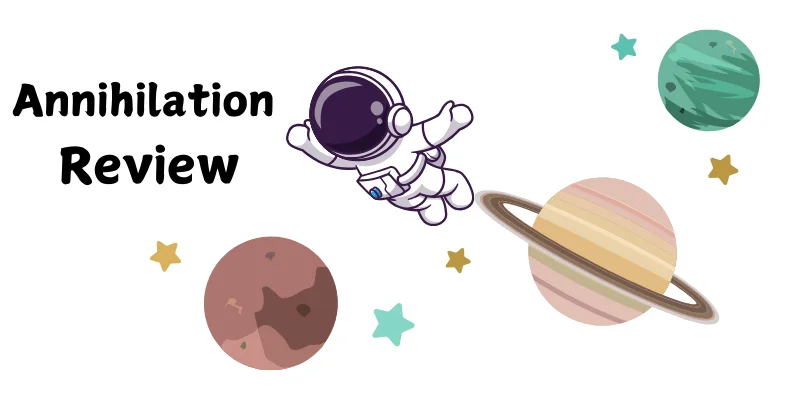A dark tunnel seems alive. A lighthouse hides secrets. The land is wild and strange. This is the world of Annihilation. Are you ready to enter Area X?
Jeff VanderMeer’s novel, Annihilation, the first in the Southern Reach Trilogy, introduces readers to Area X—a strange, dangerous zone where nature behaves unpredictably, and explorers rarely return.
The story follows a team of four women—a biologist, a psychologist, a surveyor, and an anthropologist—as they enter this mysterious region. Through stunning descriptions and eerie suspense, VanderMeer crafts a tale of survival, discovery, and transformation that captivates sci-fi fans and casual readers alike.

What to expect in this Annihilation Book Review:
- Annihilation Plot Summary
- An in-depth review will include the characters’ analysis, strengths and weaknesses of the book, writing style analysis, themes exploration, etc.
- Final Recommendations
So let’s jump in.
Annihilation – Plot Summary
Let us start with the book summary of Annihilation before reviewing:
1. Setting the Scene
Area X is a strange and dangerous place. It appeared mysteriously and has been the focus of several expeditions. Each team that entered faced disaster. Some teams disappeared, others died mysteriously, and a few returned, but they were never the same.
In Annihilation, a new group of explorers is sent to uncover the truth. This group is different—it’s made up entirely of women. The team includes:
- A biologist who is curious but emotionally distant.
- A psychologist who leads the group and uses hypnosis to control them.
- A surveyor skilled in navigation and survival.
- An anthropologist, whose role is to observe human behavior.
This team has no names, only titles. They enter Area X, knowing it’s a place where logic and reality seem to fall apart.
2. The Journey Into Area X
When the team crosses into Area X, everything feels unsettling. The environment is wild and strange. At their base camp, they find a large structure that looks like a tunnel but feels alive. The biologist calls it “the tower.”
Inside the tower, they discover words written on the walls, glowing with strange spores. The words seem to move and grow. This discovery creates tension among the group.
They also visit a lighthouse that previous expeditions used. Inside, they find abandoned journals and signs of violence. It becomes clear that something horrifying happened to those who came before.
3. Unfolding Mysteries
The biologist starts to feel different after inhaling spores from the tower. While others seem confused and controlled by the psychologist’s hypnosis, the biologist becomes immune. This makes her feel isolated from the group.
As they explore deeper, the team begins to unravel. Members disappear one by one, and paranoia sets in. The biologist starts to question whether she can trust anyone.
4. Climactic Moments
The biologist confronts the “crawler,” a glowing, shifting entity inside the tower. Its presence is terrifying and defies understanding.
She also finds her husband’s journal. He was part of a previous expedition and may have been replaced by a doppelganger before returning home. This discovery is deeply emotional and changes her perspective.
5. The Biologist’s Decision
After uncovering the unsettling truth about Area X, the biologist decides not to return to her previous life. She discovers her husband’s journal, which reveals that he may have become a doppelganger before he left Area X. This deeply affects her but also gives her a sense of closure.
Instead of leaving, the biologist chooses to stay in Area X. She feels a strange connection to the mysterious place, despite its dangers. She seems drawn to its unknown forces, even though they are beyond human understanding.
6. Facing the Unknown
The biologist describes her final moments in the tower with the “crawler,” an alien entity responsible for the glowing, cryptic words on the walls. This encounter is intense and surreal, blending fear and fascination. It’s clear that Area X has profoundly changed her—physically, emotionally, and mentally.
7. An Open-Ended Conclusion
The book ends without providing concrete answers. The biologist accepts her transformation and her place in Area X. She chooses to continue exploring the strange, shifting environment, even though it may lead to her complete annihilation or evolution into something new.
Annihilation Book Review
Now I will share with you the book review of Annihilation:

1. Writing Style and Narration
I will cover writing style and narration in three parts as under:
1.1. Atmosphere
The atmosphere in Annihilation pulled me in from the very first page. Jeff VanderMeer is incredible at creating tension and unease.
I could feel the strangeness of Area X in every scene—the way the plants moved like they were watching, the stillness in the air, and the sense that something was always just out of sight. It’s not just creepy; it’s immersive. I found myself almost holding my breath as I read.
1.2. Narrative Perspective
The story is told through the biologist’s journal. I think this was a brilliant choice. It feels personal, like we’re reading her private thoughts. At the same time, it makes you question everything.
How much of what she’s writing is real? How much is influenced by Area X? Her perspective adds to the mystery and makes you feel like you’re right there with her.
1.3. Language
The writing itself is beautiful but strange. Sentence structure is good. VanderMeer uses vivid, lyrical descriptions that almost feel like poetry. For example, when he describes the landscape or the tower, it’s mesmerizing but unsettling. The reflective tone of the biologist’s narration made me pause and think. It’s not just a story—it’s an experience.
2. Characters and Characterization
Let’s now analyze characters of Annihilation:
2.1. The Biologist
The biologist is such an interesting protagonist. She’s not a typical hero. She’s quiet, introverted, and deeply curious about nature. Her motivations feel deeply personal—she’s not just there for the mission; she’s also trying to understand herself and her connection to the world.
As the story unfolds, you can see how Area X changes her. It’s not just physical but emotional too. By the end, she feels like a completely different person, and I couldn’t stop thinking about her choices.
2.2. The Supporting Characters
The other members of the team—the psychologist, the surveyor, and the anthropologist—play smaller roles, but they’re essential to the story. The psychologist is the leader, but she’s manipulative and keeps secrets from the group.
The surveyor is tough and practical, focused on survival. The anthropologist fades into the background early on. Each character brings a unique dynamic to the group, and their interactions are tense and unpredictable.
3. Themes and Symbolism in Annihilation
3.1. Humanity vs. Nature
Annihilation explores humanity’s struggle to control and understand nature. The team enters Area X hoping to study it, but they quickly realize that nature here defies logic and resists human intervention. The environment is unpredictable and uncontrollable, challenging our belief that we can dominate the natural world.
3.2. Identity and Transformation
The biologist’s journey is one of self-discovery and transformation. As she spends more time in Area X, she starts questioning her past and identity. The environment forces her to change, and the theme of annihilation reflects her inner transformation—destroying her old self to become something new.
3.3. The Unknown
At its core, Annihilation is about the unknowable. Area X represents forces beyond human comprehension, tapping into cosmic horror. The team struggles to understand what’s happening around them, highlighting humanity’s smallness in the face of vast, mysterious forces.
3.4. Annihilation and Creation
The title Annihilation represents both destruction and creation. While Area X seems to destroy everything, it also leads to new forms of life and change. This duality reflects the cycle of decay and renewal in both the environment and the characters’ personal journeys.
4. Strengths of Annihilation
I found the following strengths in Annihilation:

- Atmospheric and Immersive Setting
Annihilation excels at creating a deeply atmospheric and unsettling environment. Area X feels like a living, breathing place, full of mystery and danger. VanderMeer’s descriptive writing pulls readers in, making the environment feel as alien and unpredictable as the characters experience it. - Intriguing and Complex Themes
The novel explores profound themes like identity, transformation, and the unknowable forces of nature. It prompts readers to think deeply about human nature, our limitations, and our inability to fully understand the world around us. The exploration of these themes adds layers of complexity to the story. - Psychological Depth and Characterization
The biologist, as the main character, is richly developed. Her inner journey and transformation throughout the book are thought-provoking, as she grapples with her own identity and the changes occurring in both herself and the environment. This psychological depth makes her a compelling protagonist. - Mysterious and Unpredictable Plot
The book keeps readers on edge by constantly challenging what they know. The mysteries of Area X unfold slowly, creating suspense and drawing readers deeper into the story. The plot is full of twists and turns, ensuring that the story never feels predictable. - Lyrical and Reflective Prose
VanderMeer’s writing style is one of the book’s most praised elements. The prose is lyrical and reflective, creating a dreamlike quality that enhances the story’s themes of mystery and the unknown. The writing feels haunting, with vivid descriptions that linger in the reader’s mind long after finishing the book.
5. Weaknesses of Annihilation
Here are some shortcomings:

- Abstract and Complex Themes
The themes in Annihilation are not easily digestible, especially for casual readers. The book delves into complex philosophical and existential questions, and the symbolism can be elusive. Readers looking for a straightforward story may struggle to fully grasp the deeper layers of meaning. - Slow Pacing
Some readers find the pacing of Annihilation to be slow. The novel is heavy on atmosphere and introspection, with long passages focused on the biologist’s thoughts. This can feel meandering to readers who are more interested in action packed storytelling or plot progression. - Ambiguous Ending
While the open-ended conclusion adds to the book’s mystery, it may leave some readers frustrated. Many feel that the ending raises more questions than it answers, making it unsatisfying for those who prefer a clearer resolution.
Reception and Awards of Annihilation
Let us see book achievements and how readers found it around the world:

1. Critical and Reader Responses
Critics praised Annihilation for its eerie atmosphere and thought-provoking themes. Its focus on the unknowable and its introspective narrative was compared to cosmic horror works. However, the book’s ambiguous ending left some readers frustrated, though many were captivated by its mystery and tension.
2. Awards and Nominations
The novel won the Shirley Jackson Award for Best Novel and was nominated for the Arthur C. Clarke Award. It quickly became a favorite on best-of lists, earning recognition as one of the top science fiction books of 2014.
3. The Movie Adaptation
In 2018, Annihilation was adapted into a film by Alex Garland. While visually stunning, the movie takes creative liberties with the plot, simplifying some themes and altering the ending. Though different from the book, the film introduced the novel to a wider audience and sparked renewed interest in VanderMeer’s work.
Conclusion – Final Recommendation
Annihilation by Jeff VanderMeer is a masterful blend of mystery, horror, and science fiction. Its enigmatic plot, vivid descriptions, and psychological depth immerse readers in a world as fascinating as it is unsettling.
While its ambiguity may not suit everyone, it offers a thought-provoking experience for those who enjoy unraveling complex narratives.
This book challenges perceptions and lingers in the mind long after the last page, making it a must-read for fans of speculative fiction.
FAQs
Here are some FAQs about Annihilation:
What is Annihilation by Jeff VanderMeer about?
It’s a sci-fi novel exploring an expedition into a mysterious region called Area X, blending mystery, horror, and psychological depth.
Is Annihilation part of a series?
Yes, it’s the first book in the Southern Reach trilogy.
Who would enjoy reading Annihilation?
Fans of speculative fiction, psychological thrillers, and atmospheric storytelling will love it.
Is Annihilation difficult to understand?
The book’s ambiguity and layered themes can be challenging but are rewarding for readers who enjoy complex narratives.
What makes Annihilation unique?
Its eerie atmosphere, unreliable narration, and open-ended mysteries set it apart from typical sci-fi novels.



